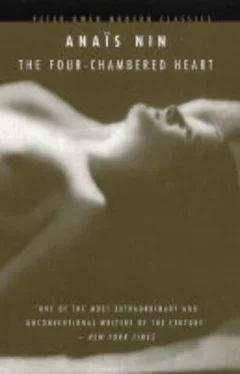Anaïs Nin - The Four-Chambered Heart
Здесь есть возможность читать онлайн «Anaïs Nin - The Four-Chambered Heart» весь текст электронной книги совершенно бесплатно (целиком полную версию без сокращений). В некоторых случаях можно слушать аудио, скачать через торрент в формате fb2 и присутствует краткое содержание. Год выпуска: 2004, ISBN: 2004, Издательство: Peter Owen Limited, Жанр: Классическая проза, Эротические любовные романы, на английском языке. Описание произведения, (предисловие) а так же отзывы посетителей доступны на портале библиотеки ЛибКат.
- Название:The Four-Chambered Heart
- Автор:
- Издательство:Peter Owen Limited
- Жанр:
- Год:2004
- ISBN:9780720611557
- Рейтинг книги:3 / 5. Голосов: 1
-
Избранное:Добавить в избранное
- Отзывы:
-
Ваша оценка:
- 60
- 1
- 2
- 3
- 4
- 5
The Four-Chambered Heart: краткое содержание, описание и аннотация
Предлагаем к чтению аннотацию, описание, краткое содержание или предисловие (зависит от того, что написал сам автор книги «The Four-Chambered Heart»). Если вы не нашли необходимую информацию о книге — напишите в комментариях, мы постараемся отыскать её.
The Four-Chambered Heart — читать онлайн бесплатно полную книгу (весь текст) целиком
Ниже представлен текст книги, разбитый по страницам. Система сохранения места последней прочитанной страницы, позволяет с удобством читать онлайн бесплатно книгу «The Four-Chambered Heart», без необходимости каждый раз заново искать на чём Вы остановились. Поставьте закладку, и сможете в любой момент перейти на страницу, на которой закончили чтение.
Интервал:
Закладка:
She felt this god again, whoever he was, taking her tenderly, holding her, putting her to sleep. She felt protected, her nerves unknotted, she felt peace. She fell asleep, all her anxieties dissolved. How she needed him, whoever he was, how she needed sleep, she needed peace, she needed god the father.
In the orange light of the fishing port, the indigo spread of the sea, the high flavor of the morning rolls, the joyousness of early mornings on the wharf, the scenes with Rango became more and more like hallucinations.
Rango walking through the reeds seemed like a Balinese, with his dark skin and blazing eyes.
When they sat at the beach late at night around a fire and roasted meat, he seemed so in harmony with nature, crouching on his strong legs, nimble with his hands. When they returned from long bicycle rides, after hours of pedaling against a brisk wind, tired and thirsty but drugged with physical euphoria and content, then the returns to his obsessions seemed more like a sickness.
Djuna knew all the prefaces to trouble. If during the ride she had sung in rhythm with others, or laughed, or acquiesced, Rango would begin: “This morning I found your bicycle and the boy’s against the wall of the cafe, so close together, as if you had spent the night together.”
“But Rango, he arrived after me, he merely placed his bicycle next to mine. Everyone has breakfast at the same cafe. It doesn’t mean anything.”
At times Djuna felt that Rango had caught Zora’s madness. Then she felt compassion for him, and would answer with patience, as you would a sick person.
She knew that we love in others some repressed self. In consoling Rango, reassuring him, was she consoling some secret Djuna who had once been jealous and not dared to reveal it?
(We love shadows of our hidden selves in others. Once I must have been as jealous as Rango, but I did not reveal it, even to myself. I must have experienced such jealousy in so hidden a realm of my own nature that I was not even aware of it. Or else I would not be so patient with Rango. I would not feel compassion. He is destroying us both by this jealousy. I want to protect him from the consequences… He is driving me away from him. I should run away now, yet I feel responsible. When we see another daring to be what we did not dare, we feel responsible for him…)
But once she awakened so exhausted by Rango’s demon that she decided to frighten him, to run away, hoping it might cure him.
She packed and went to the station. But there was no train until evening. She sat disconsolately to wait.
And Rango arrived. He looked distracted. “Djuna! Djuna, forgive me. I must have been mad. I didn’t tell you the truth. A friend of mine has been making absinthe in his cellar and every day at noon we have been sampling it. I must have taken a good deal of it all these days.”
She forgave him. She also thought, in an effort always to absolve him: “His slavery to Zora’s needs is so tremendous and he does not dare to rebel. She has a gift for making him feel that he never does enough, and to burden him with guilt, and that may be why, when he comes to me, he has to rebel and be angry about something, he has to explode. I ais scapegoat.”
And she was tied to Rango through this breathing tube, tied to his explosions. She might one day come to believe, as he did, that violence was necessary to dive to the depths of experience.
On these revolving stages of the unconscious, the last hidden jungles of our nature which we have controlled and harnessed almost to extermination, sealing all the wells, it is no wonder when we seek to open these sealed wells again to find a flow of life we find instead a flow of anger.
Thus in anger Rango threw like a geyser this nature’s poison, and then refused to admit responsibility for the storms. His angers came like lightning, and each time Djuna was delivered of her own.
But the black sun of his jealousy eclipsed the Mediterranean sun, churned the sea’s turquoise gentleness.
There were times when she lay alone on the sand and sought to remember what she had tried to reach through the body of Rango, what her first sight of him, playing on his guitar and evoking his gypsy life, had awakened in her.
Through him, to extend into pure nature.
There were times when she remembered his first smile, the ironic smile of the Indian which came from afar like the echo of an ancient Indian smile at the beginning of Mayan worlds; the earthy walk issued from bare footsteps treading paths into the highest mountains of the world, into the most immune lakes and impenetrable forests.
In her dream of him she returned to the origins of the world, hearing footsteps in Rango which were echoes of primeval footsteps hunting.
She remembered, above all, stories, the one Rango had told her about sitting on a rock on top of a glacier and asserting he had felt the spinning of the earth!
She had kissed eyes filled with remembrance of splendors, eyes which had seen the Mayans bury their gold treasures at the bottom of the lakes out of reach of the plundering Spaniards.
She had kissed the Indian princes of her childhood fairytales.
She had plunged with love and desire into the depths of ancient races, and sought heights and depths and magnificence.
And found…found deserts where vultures perpetuated their encirclement, no longer distinguishing between the living and the dead.
Found a muted city resting on ruined columns, cracked cupolas, tombs, with owls screaming like women in childbirth.
In the shadows of volcanoes there were fiestas, orgies, dances, and guitars.
But Rango had not taken her there.
To love he brought only his fierce anxieties; she had embraced, kissed, possessed a mirage. She had walked and walked, not into the TIFY” nd the music, not into laughter, but into the heart of an Indian volcano…
THE TRAP WAS INVISIBLE BY DAY
The trap was a web of senseless duties. No sooner were Djuna’s eyes open than she saw Zora vividly, lying down, pale, with soft flabby hands touching everything with infantile awkwardness. Zora missing her aim, dropping what she held, fumbling with a door, and moving so abnormally slow and with such hazy, uncertain gestures that it took her two hours to get dressed.
Compassion was the cover with which Djuna disguised to her own eyes her revulsion for Zora’s whining voice, unkempt body, and shrewd glance, for her beggar’s clothes which were a costume to attract pity, for the listless hair she was too lazy to brush, for the dead skin through which the blood stagnated.
If one knew what lay in Zora’s mind, one would turn away with revulsion. Djuna had heard her sometimes, half asleep, monotonously accusing doctors, the world, Rango, herself, friends, for all that befell her.
Revulsion. There is a guilt not only for acts committed but for one’s thoughts. Now that the trap had grown so grotesque, futile, stifling, Djuna wished every day that Zora might die. A useless life, grasping food, devotion, service, and giving absolutely nothing, less than nothing. A useless life, exuding poison, envy, a strangling tyranny.
If she died, Rango’s life might soar again, a fire, his body strong and exuberant, his imagination propelling him to all comers of the world. At his worst moments, there was always a fire in him. In Zora there was coldness. Only the mind at work, deforming, denigrating, accusing.
Only a showman left in her. “See my wound, see what I suffer. Love me.”
But love is not given for such reasons.
The trap is inescapable. Djuna has nightmares of Zora’s yellow face and lack of courage. She awakens early, to market for a special bread, a special meat, a special vegetable. There is an appointment for x-rays of the chest, for this week Zora believes she has tuberculosis. Hours wasted on this, only to hear the doctor say: “There’s nothing wrong. Hysterical symptoms. She should be taken to a psychiatrist.”
Читать дальшеИнтервал:
Закладка:
Похожие книги на «The Four-Chambered Heart»
Представляем Вашему вниманию похожие книги на «The Four-Chambered Heart» списком для выбора. Мы отобрали схожую по названию и смыслу литературу в надежде предоставить читателям больше вариантов отыскать новые, интересные, ещё непрочитанные произведения.
Обсуждение, отзывы о книге «The Four-Chambered Heart» и просто собственные мнения читателей. Оставьте ваши комментарии, напишите, что Вы думаете о произведении, его смысле или главных героях. Укажите что конкретно понравилось, а что нет, и почему Вы так считаете.












